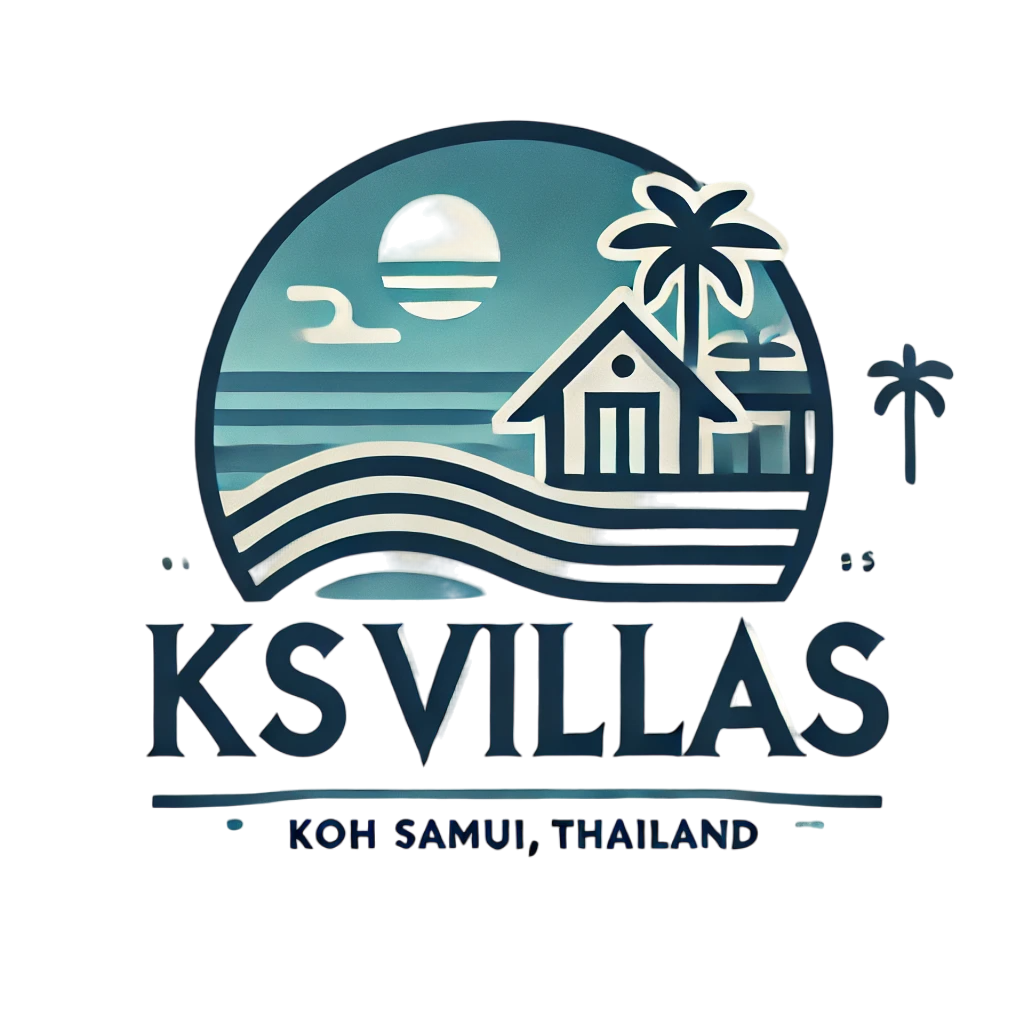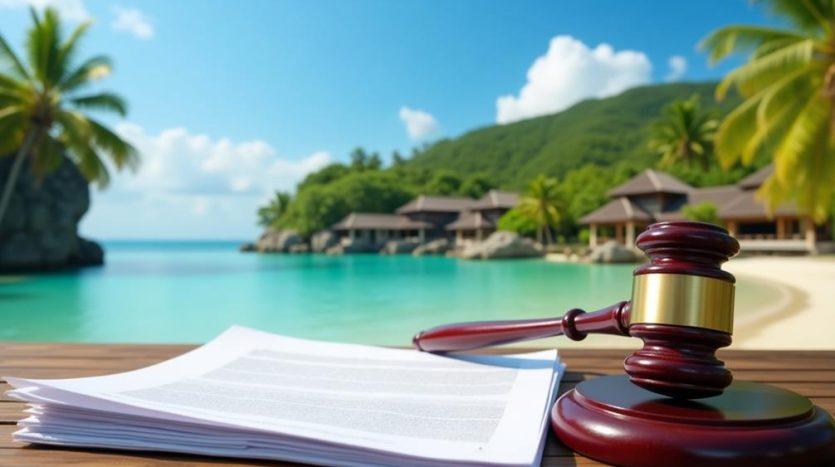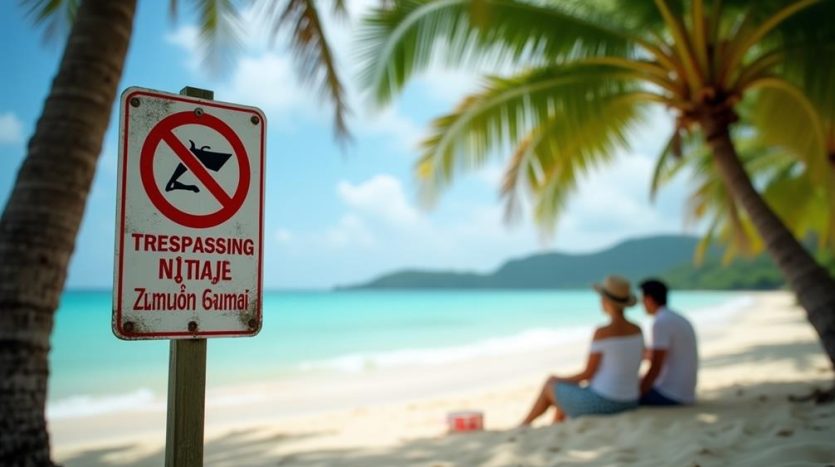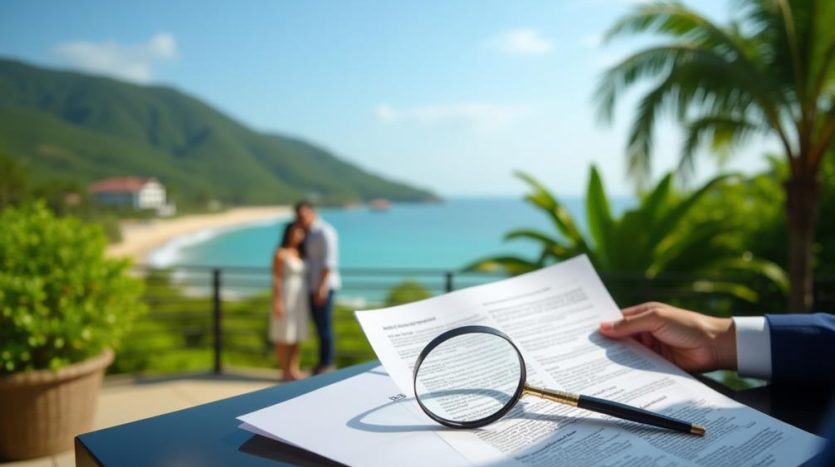Can Foreigners Buy Property in Koh Samui?
When considering whether you can buy property in Koh Samui, it's important to understand that while you can't directly purchase land, there are still viable options available. You might explore long-term leases or condominium ownership, where up to 49% of units in a project can be foreign-owned. These alternatives come with their own sets of rules and complexities, making due diligence and local legal advice indispensable. But what about luxury villas and development plots? How do leasehold agreements and financing options fit into the puzzle? Let's explore these aspects to guarantee you make an informed investment decision.
Key Takeaways
- Foreigners cannot directly own land in Koh Samui but can lease it for up to 30 years with renewal options.
- Foreigners can own up to 49% of condominium units in any project in Koh Samui.
- Setting up a Thai Limited Company can facilitate indirect land ownership, but nominee shareholders are against Thai law.
- Legal assistance is crucial to navigate ownership restrictions, lease agreements, and compliance with Thai property laws.
- Due diligence, including market analysis and property inspections, is essential for a secure investment in Koh Samui.
Legal Framework for Foreigners
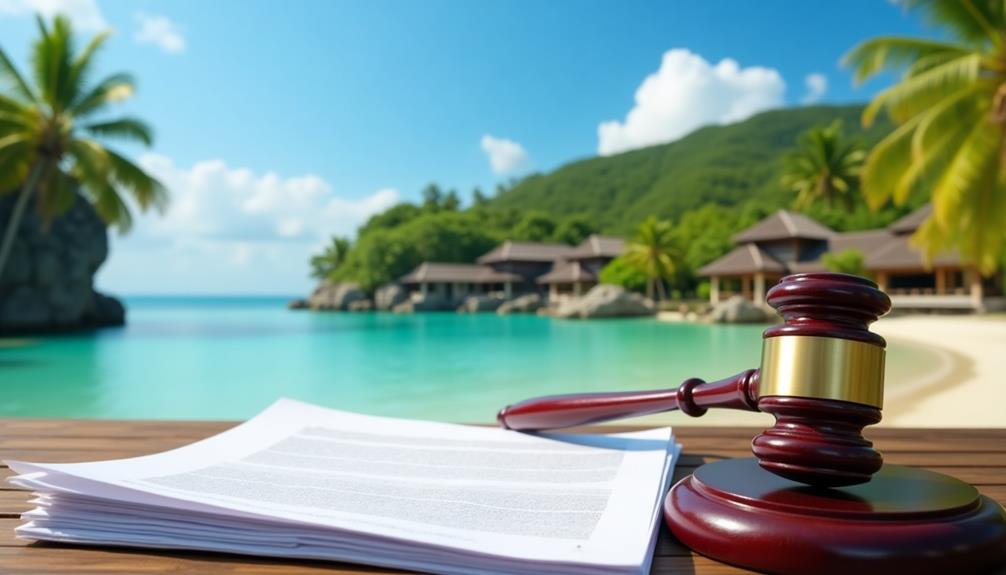
Understanding the legal framework for foreigners buying property in Koh Samui is vital if you're considering an investment in this tropical paradise. Thailand doesn't allow foreigners to directly own land, but don't let that dampen your spirits.
Clever legal structures can help you navigate this restriction. For instance, you can lease the land for up to 30 years, with options to renew. Alternatively, you can buy a condo since foreign ownership laws for condos are more lenient—up to 49% of the units in any condominium project can be foreign-owned.
Foreign investment in Koh Samui's property market is thriving, thanks to these adaptable legal avenues. But, it's important to understand your property rights to avoid any nasty surprises.
Make sure you conduct thorough due diligence, and consult with a local lawyer who specializes in real estate law. They'll help you interpret the fine print and secure your investment.
Types of Properties Available
When considering property investment in Koh Samui, you'll find a variety of options ranging from luxury villas and houses to condominiums and apartments, as well as land and development plots.
Each property type offers unique advantages depending on your investment goals and lifestyle preferences.
Understanding these options will help you make an informed decision tailored to your needs and market opportunities.
Luxury Villas and Houses
Among the range of properties available in Koh Samui, luxury villas and houses stand out as prime investments for discerning buyers.
Whether you're looking for a second home or an income-generating asset, these properties offer unparalleled advantages. Imagine waking up to the serene sounds of waves at your beachfront property or enjoying spectacular sunsets from your private infinity pool. These luxury rentals don't just offer a home; they provide an experience.
You'll find that these properties often come with exceptional amenities like modern kitchens, spacious living areas, and even private gyms. High-end materials and tasteful designs guarantee that every corner of your villa or house exudes sophistication.
Plus, the prime locations, often nestled in lush landscapes or perched on exclusive coastal spots, promise breathtaking views and easy access to local attractions.
Investing in a luxury villa or house in Koh Samui isn't just about comfort, though. The island's booming tourism industry makes these properties highly desirable for short-term rentals, securing a steady return on investment.
Condominiums and Apartments
While luxury villas and houses offer unparalleled opulence and space, condominiums and apartments provide a more accessible entry point into Koh Samui's property market.
You'll find that condos and apartments not only fit a more modest budget but also come with perks like shared amenities and professional property management. Plus, they've got a leg up in the market trends game, often being the first to see value appreciation due to their urban locations and higher demand among expats.
Imagine waking up to a panoramic view of the Gulf of Thailand without having to break the bank. That's the kind of lifestyle you can expect in a Koh Samui condo.
And let's be honest, who wouldn't want a maintenance-free lifestyle where someone else worries about the leaky faucet? Property management services in these complexes handle everything from repairs to security, giving you more time to enjoy the island life.
Market trends suggest that the demand for condominiums in Koh Samui is on the rise, driven by increasing tourism and expat interest.
Land and Development Plots
Investing in land and development plots in Koh Samui offers a unique opportunity for those looking to create a bespoke property or initiate a commercial venture. The island's diverse landscape provides options ranging from beachfront paradises to serene hillside plots.
Before you jump in, it's essential to understand the types of land available and their potential.
- Beachfront Plots: Perfect for luxury villas or resort developments, but come with higher land valuation.
- Hillside Plots: Offer stunning panoramic views and cooler climates, ideal for private residences or boutique hotels.
- Commercial Land: Located in bustling areas, these plots are prime for businesses and come with high property appraisal values.
- Residential Land: Versatile and found in various locations, suitable for building homes or rental properties.
While Koh Samui's allure is undeniable, maneuvering land valuation and property appraisal can be tricky.
You'll want expert advice to guarantee you're making a sound investment.
Don't forget, though, the Thai law restricts direct land ownership by foreigners, so you'll need to explore options like leasehold agreements or setting up a Thai company.
But hey, a little paperwork never hurt anyone, especially when paradise awaits!
Land Ownership Restrictions
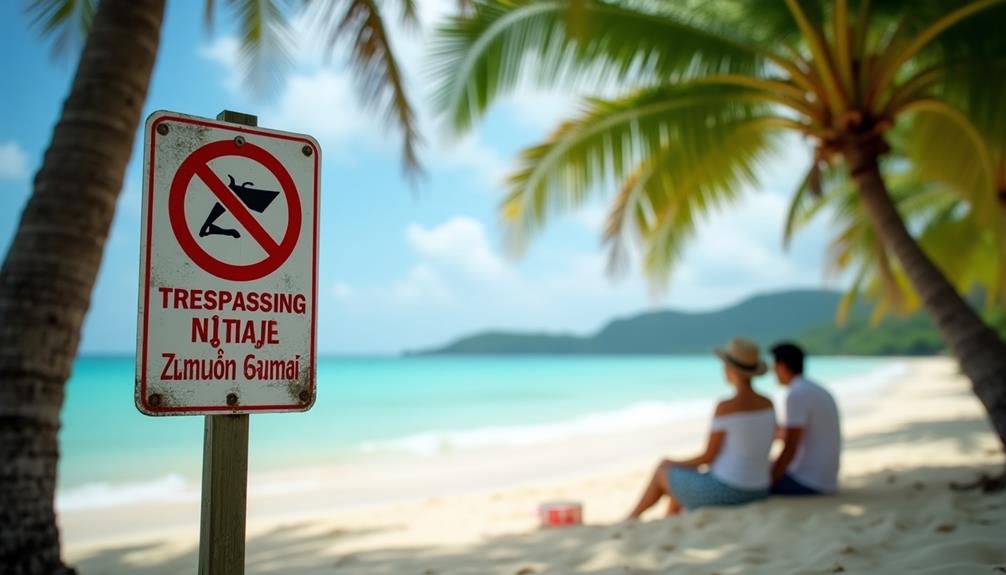
When considering the purchase of property in Koh Samui, it's crucial to understand Thailand's stringent land ownership restrictions for foreigners. Thailand has some of the strictest foreign property regulations globally, meaning you, as a non-Thai, can't directly own land.
However, don't pack your bags just yet! There are strategic ways to navigate these ownership rights restrictions.
One option is to lease the land on a long-term basis, typically up to 30 years, with an option to renew. It's like having a landlord, but you're the tenant for three decades.
Another method involves setting up a Thai Limited Company where you own less than 49% of the shares, ensuring the majority is held by Thai nationals. Be cautious here, though; the law frowns upon using nominee shareholders just to skirt foreign ownership rules.
Feeling adventurous? Marrying a Thai citizen could grant you more leeway, but love should be the main motive, not just land.
Always hire a reputable local attorney who knows the ins and outs of these labyrinthine regulations. While owning the land may be off the table, with the right guidance, you can still enjoy a piece of paradise in Koh Samui.
Condominium Ownership Rules
When considering condominium ownership in Koh Samui, you need to be aware of the foreign ownership limits, which cap at 49% of the building's total units.
Guarantee you understand the legal requirements, such as obtaining a foreign exchange transaction form, to facilitate your purchase.
Maneuvering these rules effectively can secure your investment while complying with Thai property laws.
Foreign Ownership Limits
Maneuvering the intricacies of foreign ownership limits in Koh Samui's condominium market can be a bit tricky but is vital for making informed investment decisions. Understanding these limits is important for anyone jumping into foreign investment in this tropical paradise.
In Thailand, the property regulations stipulate that foreigners can own up to 49% of the total area of all units in a condominium building.
To make it clear:
- You can own a condo as long as it doesn't surpass the 49% foreign ownership cap.
- The funds used to purchase the condo must come from abroad.
- The money transfer must be recorded in foreign currency.
- Verify the condominium is in a development that complies with the Condominium Act.
Keeping these points in mind will help you navigate the often murky waters of property regulations and avoid any unpleasant surprises.
It's like trying to dance the tango while dodging landmines—exciting but requiring careful steps. By understanding these rules, you'll be better equipped to make savvy decisions and avoid potential pitfalls in your Koh Samui condo investment.
Legal Requirements
Steering through foreign ownership limits is just the beginning; grasping the legal requirements for condominium ownership in Koh Samui is equally important.
Unlike land, condos offer a more straightforward path for foreign buyers. As a foreigner, you're legally allowed to own up to 49% of the total floor area of all units in a condominium building. This means you'll need to make sure your chosen condo complies with this ownership ratio to avoid any legal hiccups.
Now, let's talk property taxes. You'll be responsible for paying the annual property tax, which varies based on the assessed value of your condo.
Don't forget the one-time transfer fee, usually split between buyer and seller, which is 2% of the appraised value. Keeping up with these taxes is vital to maintaining your ownership rights and avoiding penalties.
Another key point is the Foreign Exchange Transaction Form (FETF). You must present this form, confirming funds were transferred from abroad in foreign currency, for amounts over $50,000.
Without it, you can't register the property under your name. So, make sure your finances are in order and all paperwork is meticulously handled.
Leasehold Agreements

Maneuvering the complexities of leasehold agreements can be pivotal for foreigners looking to invest in property in Koh Samui.
You'll find that understanding leasehold terms and leasehold benefits is vital. Typically, leasehold agreements in Thailand last up to 30 years, with potential renewals. While you can't own land outright, you can legally lease it, offering a practical workaround.
Consider these key points:
- Leasehold Terms: Generally up to 30 years, with the possibility of renewal, often up to three times.
- Leasehold Benefits: Lower initial investment compared to outright purchase, and fewer legal hurdles.
- Renewal Clauses: ascertain your agreement includes clear terms for lease renewal to avoid future headaches.
- Legal Advice: Always consult a local lawyer to navigate the specifics and protect your interests.
Now, don't get too bogged down by the formalities.
Think of it as a long-term rental with perks. You'll have the freedom to enjoy your piece of paradise without the hefty price tag or bureaucratic red tape.
Plus, those extra savings? Perfect for a few more rounds of cocktails on the beach. Cheers to smart investing!
Investment Through Thai Companies
To invest in Koh Samui property through a Thai company, you'll need to understand the process of forming a company and its ownership structure.
Thai law requires that at least 51% of a company's shares are held by Thai nationals, which affects how you can structure your investment.
This method allows you to navigate around prohibitions on foreign land ownership while still securing your property interests.
Forming a Thai Company
Forming a Thai company is often the go-to strategy for foreigners eyeing property investments in Koh Samui. Not only does it offer a legal avenue to own land, but it also provides a structured framework for managing your investment.
First things first, you'll need to tackle company registration. This involves submitting a proposed company name, completing the necessary paperwork, and registering with the Department of Business Development (DBD).
Now, let's talk about the corporate structure. You'll need a minimum of three shareholders, and yes, it's as exciting as it sounds. Here are some key steps to keep in mind:
- Choose a Unique Company Name: It's like naming a pet, but with fewer furballs.
- Draft the Memorandum of Association: Think of it as your company's birth certificate.
- Convene a Statutory Meeting: Bring in all shareholders and make sure everyone's on the same page.
- Register Your Company: Submit everything to the DBD and get ready to pop the champagne.
While the process might seem intimidating, it's a tried-and-true method for securing your slice of paradise in Koh Samui.
Just remember, a well-structured company can turn your tropical dream into a lucrative reality.
Company Ownership Structure
Once you've navigated the waters of company registration, the next step involves understanding the company ownership structure. In Thailand, foreign investment through company formation is a popular route for acquiring property, but it comes with its own set of quirky regulations. You can't just waltz in and own 100% of the company; Thai law mandates that foreign investors can only hold up to 49% of the shares. The remaining 51% has to be owned by Thai nationals.
Now, before you start panicking about finding trustworthy Thai partners, let's explore a bit deeper. Typically, the company will have a mix of Thai shareholders, who often act as "nominees." While this might sound like a shady blind date, it's actually a common practice. However, tread carefully and confirm that all legalities are thoroughly vetted to avoid any soap opera-worthy drama.
You'll also need a strong business plan that justifies the foreign investment, as Thai authorities don't hand out approvals like candy.
Once everything's in place, you'll enjoy the perks of owning property in Koh Samui while technically playing by the rules. So, keep your wits about you and your sense of humor intact; you're in for an adventure.
Due Diligence Process
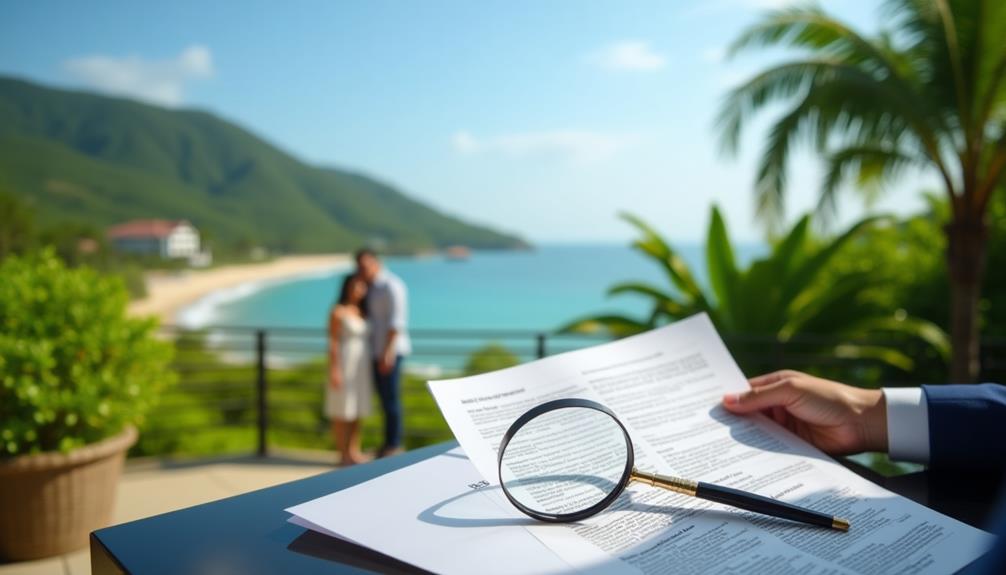
Starting on the due diligence process when buying property in Koh Samui is essential to safeguarding your investment. You wouldn't want to dive headfirst into a coconut grove without checking for hidden snakes, right?
Here's what you need to focus on:
- Property inspections: Hire a professional to inspect the property for structural integrity, pest infestations, and overall condition. You don't want your dream villa turning into a money pit.
- Market analysis: Understand the local real estate trends. Are prices rising or falling? Is the area developing? A solid market analysis can help you avoid overpaying.
- Legal checks: Verify the title deed and ascertain the land isn't on a protected or restricted list. You don't want to buy a beachfront property only to find out it's in a marine park.
- Financial clarity: Confirm you understand all costs involved, including taxes, transfer fees, and any potential hidden charges. Surprises are fun, but not when it comes to your bank account.
Financing Options
Maneuvering the financing options for purchasing property in Koh Samui can be complex but manageable with the right approach. As a foreigner, you're faced with the challenge of steering mortgage options and finding financing strategies that suit your needs. While Thai banks generally don't offer home loans to non-residents, don't fret; there are alternative routes to explore.
Consider these three primary financing mechanisms:
| Financing Option | Description | Pros & Cons |
|---|---|---|
| Developer Financing | Offered by property developers, often with flexible terms. | Pro: Simplified process; Con: Higher interest |
| Offshore Financing | Secured from banks outside Thailand, especially in your home country. | Pro: Familiar terms; Con: Currency risks |
| Private Loans | Arranged through private lenders or financial institutions. | Pro: Flexibility; Con: Higher scrutiny |
Developer financing can be straightforward but might come with steeper interest rates. Offshore financing lets you leverage familiar terms and conditions, yet currency fluctuations can be a roller-coaster ride. Private loans offer flexibility but often entail more rigorous scrutiny and higher rates.
Tax Implications

Maneuvering the tax implications of purchasing property in Koh Samui is essential for guaranteeing your investment remains lucrative. While the prospect of owning a slice of paradise is tantalizing, understanding the tax landscape can save you from unexpected financial headaches.
First, consider your tax residency. If you're a non-resident, your tax obligations in Thailand might differ, especially when it comes to capital gains tax. Speaking of which, capital gains on property sales can catch you off guard if you're not prepared.
Here are some key points to keep in mind:
- Property Transfer Fee: Typically 2% of the appraised value, this fee is often split between buyer and seller.
- Stamp Duty: At 0.5% of the appraised value, it's a smaller fee but still one to factor in.
- Withholding Tax: For companies, it's 1% of the appraised value or the sale price, whichever is higher. For individuals, it's a progressive rate based on the length of ownership.
- Specific Business Tax: At 3.3%, it applies if the property is sold within five years of purchase.
Navigating these taxes efficiently will guarantee your Koh Samui investment isn't just a dream but a financially sound decision. And hey, who doesn't want their slice of heaven to be tax-savvy?
Hiring Legal Assistance
Understanding the tax implications is just one piece of the puzzle when purchasing property in Koh Samui. Decoding property regulations and guaranteeing you're not stepping into a legal quagmire is another. That's where hiring legal assistance comes in. Trust us, you don't want to navigate this labyrinth without professional help—unless you enjoy rollercoasters of confusion.
First off, legal representation guarantees that all property regulations are adhered to, saving you from potential pitfalls that could turn your tropical dream into a bureaucratic nightmare.
Think of your lawyer as your property Sherpa, guiding you through complex local laws and guaranteeing your purchase is above board.
Hiring a local lawyer who specializes in property transactions can give you peace of mind. They'll scrutinize contracts, verify property titles, and handle all that pesky paperwork you'd rather avoid.
It's like having a GPS that also makes coffee.
Practical Tips for Buyers

Buying property in Koh Samui can be a rewarding investment if approached with due diligence and strategic planning. To guarantee you make an informed decision, keep these practical tips in mind.
First, familiarize yourself with current market trends. The property market in Koh Samui can be quite dynamic, so staying updated will help you spot the best opportunities. Consider working with a local real estate agent who's their finger on the pulse of the market.
Second, think about property management. If you're not planning to live in Koh Samui year-round, you'll need someone to manage your property. Hiring a reliable property management company can save you a lot of headaches.
Third, understand the legal framework. Remember, foreigners can't own land directly in Thailand, but there are legal ways to invest in property, such as through leasehold agreements or setting up a Thai company.
Lastly, take a holistic approach:
- Visit properties in person: Pictures can be deceiving.
- Check infrastructure and amenities: Reliable utilities and good road access matter.
- Evaluate rental potential: If you're considering renting it out.
- Review the property's history: Verify there are no legal disputes or hidden issues.
